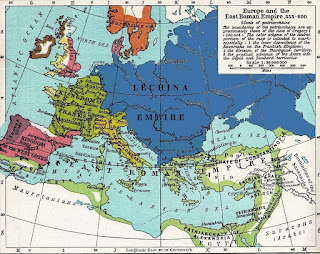Well, that went well. The six months I gave myself for an outline are already over and I haven't even determined the basic shape of the novel.
I could totally do the entire thing on Crete. Mostly in Knossos, even. The weaver as the central protagonist. Much of the story of the late bronze age can be encapsulated in one city, but Knossos has the extra cachet of having been previously the Minoan palatial center.
We've got excellent records, spectacular ruins. We have mute evidence of the coastal raiders in the retreats dug into the stony fastnesses of the inland mountain ranges. And we have those connections of trade; from the earliest moments of the bronze age through the coming of the Iron Age -- right through the Greek Dark Ages -- Crete is still in trade contact with the rest of the Ancient world so the story of Crete really can be a story of a big chunk of the bronze age.
And, yeah, keeping to one setting makes the research a little more plausible.
The opposing plan is still some version of the five man band cast; of several characters -- heroes, really -- each with their own skills as well as their own quirks and backgrounds. And hitting at least some of the fun tour stops, at least one of Mycenae, Cypress, Pi Ramses, Ugarit, Hattusha, Wilusa.
I wasn't entirely truthful above. I do have an outline for this, one that is good enough to start breaking out specific research questions (some of them very specific -- such as, at what point did the Laconians become laconic?) I can even say I'd have more fun with Setna running around the Peloponnese hooking the sword-arms of pirates with his khopesh...it's just that, at the moment, I'm so fascinated by whats happening in the palatial centers...and the potentials of a story at a smaller scale.
Oh, but there's a totally different story that is starting to creep into my head right now. It came to me today while listening to the excellent Trojan War podcast. Start with the Luwian Hypothesis, roll it all the way out, but splice in large parts of the Trojan War. So the Luwian Empire is threatening the entire Mediterranean Basin, and a Mycenaean coalition forms to oppose them -- forms with all the realpolitik, all the use of Helen as a casus belli, Odysseus playing mad to get out of the war, the sacrifice of Iphigenia, etc. All the good and the bad, that is. Of both sides, if possible.
And then take it one more step because the Luwian's are Plato's Atlantis, and oh yes the gods are real and Achilles is nigh invulnerable and all that. And no point in stopping there. Go back and trace the history of myths and stories and there are a hundred versions (and details accrete over time.) Since we're only resembling the standard Trojan War story, elements of Theseus and Jason and Medea and all sort of other interesting things can sneak in there too.
And the best part of it? The serial numbers are still under there but everything has been remelted and jumbled together so much "research" ceases to be an element at all. I mean, if you have to squint to recognize Hector, there's not a Myrmidon who can complain that the galleys have the wrong number of oars.



No comments:
Post a Comment